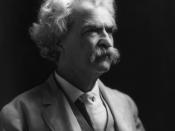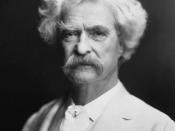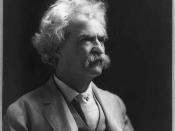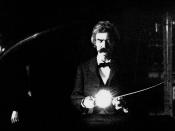Mark Twain To look at that person on the honor role, who's the best athlete, has the newest car, and gets all the ladies. Or the person in art class who continually produces the best art work and ruins the grade curve for the rest of us. Few things are harder to put up with than the annoyance of a good example. Throughout his life Mark Twain continued to produce masterpiece writing leaving no good example un-battered. A man who gets his dream job, and is despised by the whole town of just dreamers. A person who's convictions are stronger than his flesh. And a seemingly harmless man, who tells the story as it should be told and comes under the utter annoyance of the narrator. Imperfect characterization played an , obvious, major role in his writings proving that few things annoyed him more than a good example.
The pose that Twain takes to his characters that seem to be striving for excellence is quite unique.
In an excerpt from Life On The Mississippi Twain tells us of a man with a dream. As imperfection has it this man's dream did not come true. But his friend's similar dream , however, did. The narrator tells us through a blanket of jealousy how this man was perpetually annoying, and how, "there was nothing generous about this fellow and his greatness." Like many of Twain's writings this excerpt shows us a man with convictions as he looks at a seemingly good example and puts it under a different light.
Convictions that shine through in what could quite possibly be a realistic situation (in Twain's accounts of them) shimmer with imperfection.
In a part of Roughing It Twain brings us to a camp of three men. Under the inclination that they are all about to die, these men start to ponder what they could have done with the rest of their lives. They all end up making promises to themselves that they fully believe they will not have to keep. Promises of, "reform" and "examples to the rising generation." In what would seem to be a surreal end to a story of repenters continues on. These men find themselves in a comical situation and end up surviving. So what happens to the promises they never gave a thought to having to keep but for the few moments it takes a man to freeze to death in the dead cold of winter? The narrator ,before telling us that everyone ends up going back on their promises, explains to us, "The joy in our hearts at our deliverance was poisoned; well-nigh dissipated indeed." Twain surely saw this story as a quite pleasing bad example.
So out of the normal, are good examples, that they tend to attract more attention and over analization. Indeed when the narrator walks into a bar and spots the man he wishes to speak to. Before a word of conversation is muttered the narrator already knows that the thoughts about to be spoken were not what he was wanting to hear but he, "let him go on his way, and never interrupted him once." In a monotone voice this character by the name of Simon Wheeler told a story about a man who loved to place bets. A man that could usually win but would bet you either way. Twain, instead of creating in our minds this glorious and wise all knowing story teller, gives us a lazy miner who gets the details correct often enough for it to be a truthful story, but not enough to cause a scene.
To make such a general statement about the evils of a good example one must hate all aspects and any form of a good example. As society works human error is accepted as everyday life. The few perfection's in life are first looked at carefully to the point of admiration, then frowned upon, then again carefully scrutinized. To glorify anything to the point of a good example is intolerable. And the characterization of a person whom is without flaw can be found many places, but never in one of Twain's writings.





